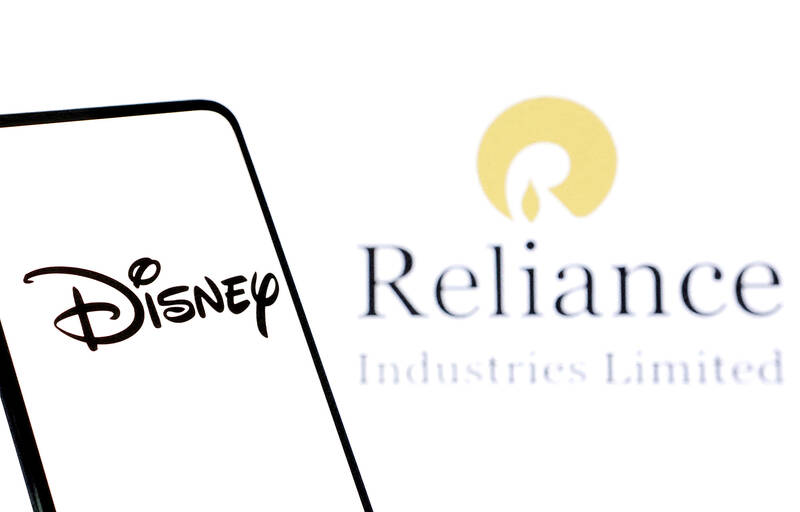Walt Disney Co and Reliance Industries Ltd have signed a binding pact to merge their media operations in India, people familiar with the matter said, as the US entertainment giant recasts its strategy amid intense competition in the world’s most-populous country.
The media unit of Reliance, controlled by billionaire Mukesh Ambani, and its affiliates are expected to own at least 61 percent in the merged entity, with Disney holding the rest, the people said.
The latest milestone and other details are likely to be announced early this week, the people said.

Photo: Reuters
The stake split between the partners might change, depending on how Disney’s other local assets are factored in by the time the deal is closed, the people said.
Disney owns a minority stake in broadcast service provider, Tata Play Ltd, which Reliance might consider acquiring, local news reports said.
Disney has been grappling with challenges in India, such as retaining subscribers and securing coveted media assets, while Reliance has cornered a larger slice of the local media and entertainment businesses in recent years.
Together, they would make a formidable media behemoth in one of the world’s fastest-growing entertainment markets.
Ambani’s unit had outbid Disney in 2022 to win the streaming rights for the Indian Premier League (IPL) cricket tournament and in April last year bagged a multiyear pact to broadcast Warner Bros Discovery Inc’s HBO shows, which were earlier with Disney.
While Disney’s streaming service, Disney+ Hotstar, managed to draw record viewers for the Cricket World Cup in October and November last year, it showed the matches for free in the cricket-crazy nation — a move aimed at clawing back subscribers even if it meant sacrificing revenue.
Reliance had streamed IPL matches earlier last year without any charge, drawing viewers in hordes.
This transaction is part of the larger consolidation efforts in the Indian media and entertainment space. Sony Group Corp planned to merge its local unit with Zee Entertainment Enterprises Ltd until differences cropped up on who would lead the newly merged media giant that ultimately gutted the deal last month.

Intel Corp chief executive officer Lip-Bu Tan (陳立武) is expected to meet with Taiwanese suppliers next month in conjunction with the opening of the Computex Taipei trade show, supply chain sources said on Monday. The visit, the first for Tan to Taiwan since assuming his new post last month, would be aimed at enhancing Intel’s ties with suppliers in Taiwan as he attempts to help turn around the struggling US chipmaker, the sources said. Tan is to hold a banquet to celebrate Intel’s 40-year presence in Taiwan before Computex opens on May 20 and invite dozens of Taiwanese suppliers to exchange views

Application-specific integrated circuit designer Faraday Technology Corp (智原) yesterday said that although revenue this quarter would decline 30 percent from last quarter, it retained its full-year forecast of revenue growth of 100 percent. The company attributed the quarterly drop to a slowdown in customers’ production of chips using Faraday’s advanced packaging technology. The company is still confident about its revenue growth this year, given its strong “design-win” — or the projects it won to help customers design their chips, Faraday president Steve Wang (王國雍) told an online earnings conference. “The design-win this year is better than we expected. We believe we will win

Chizuko Kimura has become the first female sushi chef in the world to win a Michelin star, fulfilling a promise she made to her dying husband to continue his legacy. The 54-year-old Japanese chef regained the Michelin star her late husband, Shunei Kimura, won three years ago for their Sushi Shunei restaurant in Paris. For Shunei Kimura, the star was a dream come true. However, the joy was short-lived. He died from cancer just three months later in June 2022. He was 65. The following year, the restaurant in the heart of Montmartre lost its star rating. Chizuko Kimura insisted that the new star is still down

While China’s leaders use their economic and political might to fight US President Donald Trump’s trade war “to the end,” its army of social media soldiers are embarking on a more humorous campaign online. Trump’s tariff blitz has seen Washington and Beijing impose eye-watering duties on imports from the other, fanning a standoff between the economic superpowers that has sparked global recession fears and sent markets into a tailspin. Trump says his policy is a response to years of being “ripped off” by other countries and aims to bring manufacturing to the US, forcing companies to employ US workers. However, China’s online warriors